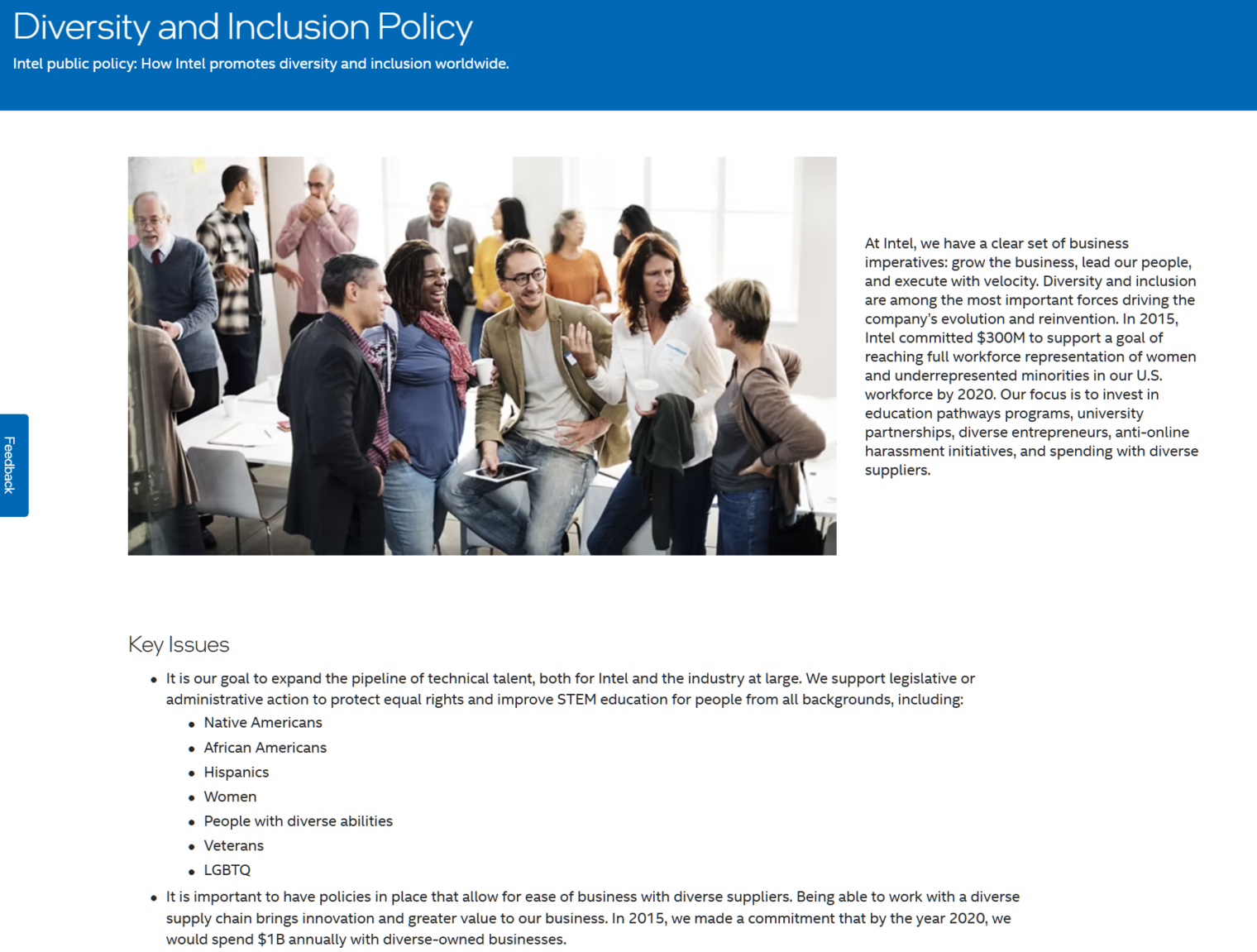On the cusp of the release of Intel’s Arrow Lake CPUs, which contain some sort of feeble “AI processor” that might boost performance by 1 percent for anyone who has a graphics card plugged into his/her/zir/their desktop PC, the company will have to fire 15 percent of its workers due to a failure to make as much money as a receptionist in an NVIDIA branch office. Even a $20 billion gift from Joe Biden (March 2024) didn’t help.
How could this have happened to a company with diverse employees and diverse suppliers? Exhibit A:
They promise to discriminate against Asian male and white male suppliers for $1 billion. Intel spent “$300M to support a goal of reaching full workforce representation of women and underrepresented minorities in our U.S. workforce by 2020” (that’s $300 million that shareholders won’t now see, apparently).
(The person wearing the Pride shirt is next to the person in Islamic attire. Is this a Queers for Palestine situation?)
Intel says “Diversity, equity, and inclusion have long been Intel’s core values and are instrumental to driving innovation and delivering strong business growth.”
If diversity drives innovation and “strong business growth,” why is Intel being left in the dust by NVIDIA, TSMC, AMD, et al.? Does TSMC have more diversity in Hsinchu than Intel can find here in the U.S.? Is diversity not a strength for Intel or not a strength for a tech company or not a strength for any company?
If Intel’s diverse employees don’t concern themselves with making money every day for the shareholders, what have the employees been focused on? The official state religion:
A long-term perspective:
(Can this be correctly adjusted for splits? Yahoo! Finance says that it is.)
Update: Intel lost 26 percent of its value by the end of the day, falling to $21.48 per share. That results in a price/earnings ratio of 22.5, a bit lower than the average for the S&P 500. Intel is a huge bargain compared to AMD, which has a P/E ratio of 160! Maybe it is time to buy Intel?



The readers added context note, which suggests an investment in Intel stock on August 2, 1999 would have generated a 50% return from dividends is sadly incorrectly way too high. First, your price return as of mid-day today would have been negative 40.6%. Then, if you had then reinvested all dividends in Intel stock, that would have generated a paltry positive 3.9% return, so your total return would be negative 36.7%. However, if you had invested the dividends in a bank account earning zero percent interest (not a bad assumption since interest rates have been zero or near zero over much of the period) over the entire period, this would have yielded a better (but still paltry) result of positive 8.6%. Over the same period, an investment in the S&P 500 (with dividends reinvested) would have generated a total return of 840% (302% from price and 540% from dividends). DEI must die?
Anyone want to hazard a guess on Nvidia’s return over the next 25 years?
I’m guessing the same as INTC’s over the last 25.
Steve: The only way that NVIDIA can be worth $3 trillion plus a healthy annual return is if AI works as hoped/dreamed. But if AI works as hoped/dream then AI should be able to engineer a low-cost alternative to NVIDIA’s GPUs!
Another $8.5 bil in Bide stimulus packages at work. Everything Bide orders the taxpayers to pay for ends up a black hole. Their Indians are just as good as TSMC’s Indians, but labor costs & regulation make it impossible for any semiconductor factory to exist in US.
TSMC has Taiwanese engineers who are better than engineers in the US semiconductor industry. Also, keep in mind that Intel was dealing with the hangover of 15 years of mismanagement before Gelsinger took over.
In 2000, as I was finishing my MBA at the University of FL, Intel flew me out to San Diego three times for a series of job interviews. While there, I looked at decent, nearby apartments. The $1200/mo. rents were enough for me to turn down the $75/yr job offer. Back then, one attractive benefit offered at Intel, was an 8-week paid “sabbatical” after every seven years of service. One regret I have to not taking the job, is that I could have got in on the CA real estate market 24 years ago.
Someone making $75K/yr should be able to easily afford a monthly rent of $1200
I recall second half of 1990th: a single family house price went already over $1 million and mortgage required 2 Silicon Valley programmers income. Back than $1,200 could afford 2-bedroom apartment rental outside of Manhattan o n the East coast, what could it rent in Silicon Valley? $75,000 back then was on lower level of programming salaries It would hardly allow to invest in real estate in coastal California without any existing assets.
Right now the average rent in San Diego is $2934/month, but that includes a lot of ugly neighborhoods and decrepit units. https://www.rentcafe.com/average-rent-market-trends/us/ca/san-diego/
Everyone: How can Intel be down 26 percent in one day? What happened to the efficient market hypothesis? None of their factories got hit by meteors. No state governor made it illegal for their employees to go into work. Nothing substantive changed between yesterday and today.
Phil, efficient market hypothesis doesn’t predict that stocks can’t gap up or down like Intel did yesterday. There are three forms of the hypothesis, but the implications of all them are that an investor can’t “beat the market”–it says nothing about stocks moving up or down, which of course they do as new information becomes known. See links.
https://en.wikipedia.org/wiki/Efficient-market_hypothesis
https://en.wikipedia.org/wiki/Financial_market_efficiency
Anon: A bad earnings report isn’t supposed to be new information, though, especially for a stock as closely followed as Intel (market cap over $100 billion until recently).
Phil, that’s exactly the point (if you believe in the efficient markets hypothesis). The announcements they made yesterday were new information that wasn’t widely anticipated and the stock price reacted accordingly. If it had been widely anticipated, the stock would have moved less or not at all. These types of announcements happen daily in the market and result in significant moves in stocks. In the case of Intel, they made a series of negative announcements (weak earnings for recent quarter, downgrade of future earnings relative to prior projections, dividend elimination, reductions in capital spending, 15% headcount reduction), hence the large reaction.
Anon: I don’t know how they kept all of that secret! I wonder if some of this is coronapanic hangover. Everyone bought new gear in 2020-2022 to support their Zoom-based lifestyle. It won’t be time for them to upgrade until 2025-7 at the earliest.
In terms of keeping it secret, they did a pretty good job; often there are leaks that result in stocks moving ahead of the actual announcement, but in this case it appears it wasn’t widely known. Also, the most significant issue facing Intel is that they lost their cutting edge manufacturing lead in the past few years, so are now a couple steps behind TSMC and Samsung, and hence are now outsourcing manufacturing of their cutting edge designs to TSMC until they have regained cutting edge manufacturing in house. This is the key issue hurting the stock (hurting profitability). Also, obviously, they are weak in GPUs, so Nvidia and AMD have taken the market.
@Anonymous, do you think Intel will ever be able to catch up to TSMC or is it a lost cause?
Relative to whether Intel can regain cutting edge manufacturing to be on par (or even exceed) the capabilities of TSMC or Samsung is the question of the moment relative to Intel the company and the stock. As usual, there are two camps, but those projecting failure to catch up clearly are dominant right now. Stating the obvious, in recent years every incremental step down in line widths for chips has become increasingly more difficult technologically and hugely more expensive. And, TSMC and Samsung are unlikely to slow their progress, so could be a scenario where it takes Intel so long to just catch up to current nodes that they continue to lag out a few years, which is the downside case. I think anyone that tells you they know for sure either way is not to believed. There are too many known unknowns.